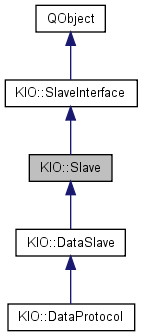kio
KIO::Slave Class Reference
Attention developers: If you change the implementation of KIO::Slave, do *not* use connection() or slaveconn but the respective KIO::Slave accessor methods. More...
#include <slave.h>
Inheritance diagram for KIO::Slave:

Classes | |
| struct | HoldParams |
| struct | SendParams |
| struct | SetConfigParams |
| struct | SetHostParams |
| struct | SuspendedParams |
Public Slots | |
| void | accept (KSocket *socket) |
| void | gotInput () |
| void | timeout () |
Signals | |
| void | slaveDied (KIO::Slave *slave) |
Public Member Functions | |
| KDE_DEPRECATED Connection * | connection () |
| void | deref () |
| void | hold (const KURL &url) |
| QString | host () |
| time_t | idleTime () |
| bool | isAlive () |
| bool | isConnected () |
| void | kill () |
| QString | passwd () |
| int | port () |
| QString | protocol () |
| void | ref () |
| void | resetHost () |
| void | resume () |
| void | send (int cmd, const QByteArray &data=QByteArray()) |
| void | setConfig (const MetaData &config) |
| void | setConnected (bool c) |
| void | setHost (const QString &host, int port, const QString &user, const QString &passwd) |
| void | setIdle () |
| void | setPID (pid_t) |
| void | setProtocol (const QString &protocol) |
| Slave (KServerSocket *unixdomain, const QString &protocol, const QString &socketname) | |
| int | slave_pid () |
| QString | slaveProtocol () |
| void | suspend () |
| bool | suspended () |
| QString | user () |
| virtual | ~Slave () |
Static Public Member Functions | |
| static Slave * | createSlave (const QString &protocol, const KURL &url, int &error, QString &error_text) |
| static Slave * | holdSlave (const QString &protocol, const KURL &url) |
Protected Types | |
| enum | { VIRTUAL_SUSPEND = 0x200, VIRTUAL_RESUME, VIRTUAL_SEND, VIRTUAL_HOLD, VIRTUAL_SUSPENDED, VIRTUAL_SET_HOST, VIRTUAL_SET_CONFIG } |
Protected Member Functions | |
| Slave (bool derived, KServerSocket *unixdomain, const QString &protocol, const QString &socketname) | |
| void | unlinkSocket () |
| virtual void | virtual_hook (int id, void *data) |
Detailed Description
Attention developers: If you change the implementation of KIO::Slave, do *not* use connection() or slaveconn but the respective KIO::Slave accessor methods.Otherwise classes derived from Slave might break. (LS)
Definition at line 44 of file slave.h.
Member Enumeration Documentation
anonymous enum [protected] |
Constructor & Destructor Documentation
Member Function Documentation
| KDE_DEPRECATED Connection* KIO::Slave::connection | ( | ) | [inline] |
- Deprecated:
- This method is obsolete, use the accessor methods within KIO::Slave instead. Old code directly accessing connection() will not be able to access special protocols.
| Slave * Slave::createSlave | ( | const QString & | protocol, | |
| const KURL & | url, | |||
| int & | error, | |||
| QString & | error_text | |||
| ) | [static] |
Creates a new slave.
- Parameters:
-
protocol protocol the slave is for. url URL the slave should operate on. error is the error code on failure and undefined else. error_text is the error text on failure and undefined else.
- Returns:
- 0 on failure, or a pointer to a slave otherwise.
- Todo:
- What are legal
protocolvalues?
| void Slave::hold | ( | const KURL & | url | ) |
| QString KIO::Slave::host | ( | ) | [inline] |
| time_t Slave::idleTime | ( | ) |
| bool KIO::Slave::isAlive | ( | ) | [inline] |
| QString KIO::Slave::passwd | ( | ) | [inline] |
| int KIO::Slave::port | ( | ) | [inline] |
| QString KIO::Slave::protocol | ( | ) | [inline] |
| void Slave::resume | ( | ) |
| void Slave::send | ( | int | cmd, | |
| const QByteArray & | data = QByteArray() | |||
| ) |
Sends the given command to the kioslave.
- Parameters:
-
cmd command id data byte array containing data
- Since:
- 3.2
Reimplemented in KIO::DataSlave.
| void Slave::setConfig | ( | const MetaData & | config | ) |
| void Slave::setHost | ( | const QString & | host, | |
| int | port, | |||
| const QString & | user, | |||
| const QString & | passwd | |||
| ) |
Set host for url.
- Parameters:
-
host to connect to. port to connect to. user to login as passwd to login with
Reimplemented in KIO::DataSlave.
| void KIO::Slave::slaveDied | ( | KIO::Slave * | slave | ) | [signal] |
| QString KIO::Slave::slaveProtocol | ( | ) | [inline] |
The actual protocol used to handle the request.
This method will return a different protocol than the one obtained by using protocol() if a proxy-server is used for the given protocol. This usually means that this method will return "http" when the actuall request was to retrieve a resource from an "ftp" server by going through a proxy server.
- Returns:
- the actual protocol (io-slave) that handled the request
| void Slave::suspend | ( | ) |
| bool Slave::suspended | ( | ) |
Tells wether the kioslave is suspended.
- Returns:
- true if the kioslave is suspended.
- Since:
- 3.2
Reimplemented in KIO::DataSlave.
| QString KIO::Slave::user | ( | ) | [inline] |
| void Slave::virtual_hook | ( | int | id, | |
| void * | data | |||
| ) | [protected, virtual] |
The documentation for this class was generated from the following files:
 KDE 3.5 API Reference
KDE 3.5 API Reference